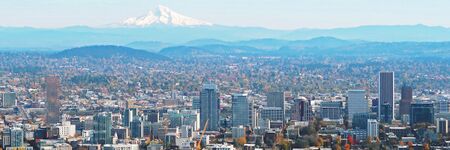Portland OR
- Members
Portland is a city of regional importance to the Pacific Northwest and the largest and most populous city in the U.S. state of Oregon. Within Oregon it is the sub-regional seat of power for Multnomah County, the largest county in Oregon by population. It is also an inland port city in the Willamette Valley region of the Pacific Northwest, at the confluence of the Willamette and Columbia rivers in Northwestern Oregon. As of 2020, Portland had a population of 652,503 making it the 25th-most populated city in the United States, the sixth-most populous on the West Coast, and the second-most populous in the Pacific Northwest, after Seattle. Approximately 2.5 million people live in the Portland metropolitan statistical area (MSA), making it the 25th most populous in the United States. Its combined statistical area (CSA) ranks 19th-largest with a population of around 3.2 million. Approximately 47% of Oregon's population resides within the Portland metropolitan area.
Activities

|
CIVIC Data Platform | |
| CIVIC is an open data platform to democratize
public information and drive meaningful engagement through neutral, nonpartisan analytics. It's built entirely by multidisciplinary teams of volunteer coders, designers and domain experts using open source technology. | ||

|
CIVIC school HUBS | |
| NSF CIVIC grant to incubate the Federal School Infrastructure Toolkit for more resilience Community services. A pilot program with be developed with the BENSON school district in Portland, and woven into the urban/rural network of the Metro regional emergency response. | ||

|
COVID Calculator | |
| The COVID Calculator determines whether you’ll quarantine or isolate, and for how long. | ||

|
Cascadia Innovation Corridor | |
Municipal, academic, corporate and federal smart city activities are being coordinated across Portland, Seattle and Vancouver BC through the integration of several regional initiatives:
| ||

|
Community Engagement and Resilience Program | |
| This project aims to address the pressing challenges faced by economically disadvantaged and environmentally vulnerable communities in North Portland. These communities struggle with limited access to jobs, essential services, and face environmental hazards such as air pollution and lack of green spaces. The program seeks to empower local residents and businesses by providing workforce training in sustainable fields like vehicle electrification, energy efficiency, and urban design, while also fostering community-led engagement to improve resilience and promote equitable economic opportunities. | ||

|
Complete Neighborhoods — Building a Healthy Connected City | |
| The goal of the Healthy Connected Neighbourhood Strategy is to bring complete neighbourhoods to 80% of the city’s population by 2035. The Strategy is integrated into the main Portland Plan, a comprehensive strategic plan to achieve urban equity and sustainability. | ||

|
Decision Theatre PSU | |
| Portland State University’s Decision Theater is designed for university researchers and regional stakeholders (i.e. government, private companies) to work on projects that “link data sets, visualization and decisions,” according to a university statement. The space is modeled after Arizona State University's Decision Theater, as well as a similar facility at the University of Chicago. | ||

|
Dwellingly | |
| Dwelling.ly is an app to improve communication between the landlord providing transitional housing and the social workers who support them. | ||

|
East Portland Resilient Island Vision Plan | |
| To execute the East Portland Resilient Island Project, RIP City Planning has partnered with Portland’s Disaster Resilience and Recovery Action Group (DRRAG), an organization composed of representatives from Portland Bureaus of Development Services, Emergency Management, Environmental Services, Water, Planning and Sustainability, Transportation, and Parks & Recreation, as well as Portland State University’s Institute for Sustainable Solutions. | ||

|
EcoMotion: Electrifying Washington Park's Circulator for a Greener Future | |
| This project converts five existing Ford transit buses to electric power. This conversion not only reduces cost over buying new it ensures the gasoline engine is removed from the road and recycled instead of being sold for another use. It also retains the chassis and other equipment saving emissions over a new purchase. | ||

|
Electric Island | |
| Electric Island is located across the street from DTNA headquarters, less than one mile from I-5, and represents the first location specifically designed for medium- and heavy-duty trucks aligned to the blueprint of the West Coast Clean Transit Corridor Initiative (WCCTCI). WCCTCI’s collaboration between nine electric utilities and two government agencies yielded a strategic plan in 2020 to electrify 1,300 miles of I-5 across the three West Coast states to provide publicly available charging for freight and delivery trucks. | ||

|
Electric Mobility Hub Demonstration | |
| An inviting & equitable community space that showcases electric mobility, integrates the street to the neighborhood, and serves as a model for future hubs. | ||

|
Eton College Energy Station | |
| The installation of an innovative renewable "Energy Station" is helping GRAHAM to reduce its carbon footprint and power demands at Eton College. | ||

|
Framework for Enhancing Disaster Mitigation and Regeneration of Community Capacity | |
| Establishment of a framework that fosters collaborative efforts between diverse public, private, and academic partners to enhance disaster mitigation, community resilience and economic growth. | ||
| GTFS | ||
| The General Transit Feed Specification (GTFS) is a widely used data format that allows public transit agencies to share their schedule, route, and fare information in a standardized way. It was originally developed by Google and TriMet (Portland, Oregon’s transit agency) in 2005 to enable transit information to be easily integrated into Google Maps. Since then, GTFS has become a global standard for public transit data, enabling real-time transit applications and analytics. | ||

|
Go-Green | |
| GoGreen aims to help people understand the impact of small sustainable gestures on their communities through technology. It presents itself as a community rewards system where participating points providers can define actions that support their communities objectives and reward people for taking them. For the users they see a marketplace of options along with rewards based on secure blockchain based smart contracts for supportive behavior. | ||

|
Green Horizons: Urban Workforce Development and Electrification Center | |
| The Green Horizons Workforce Development and Vehicle Electrification Center is pursuing a planning grant that aims to establish a positive sustainable economic impact for the Multnomah County Drainage District community. This project will produce an assessment plan for a combined workforce training and commercial grade EV fleet conversion facility. | ||

|
Home Automation | |
| Step by step process of automating a home using various technologies. | ||

|
Homma Haus Mount Tabor | |
| Homma Haus Mount Tabor is a multi-family community project, integrating the best in technology with modern architecture. This is just the beginning of HOMMA creating homes built ready for today’s lifestyle. The living spaces allow you to connect with nature, achieve mindfulness, and recharge in comfort – the essentials of a healthy life. | ||

|
Multi-modal Trip Planner | |
| Develop a tool enables commuters to plan trips encompassing public transit, ride-sharing services, bike rentals, and pedestrian routes. By integrating multiple modes of transportation, this enhanced trip planner aims to make commuting more seamless and convenient, empowering individuals to choose sustainable alternatives to private vehicles. | ||

|
Near Me Now Portland App | |
| The Near Me Now app is a map-based guide to Portland events, food carts, restaurants, bars, attractions, stores and hidden spots | ||

|
OMSI Development | |
| The OMSI Consortium is soliciting subject matter experts and qualified vendors to participate in a series of short virtual workshops during the months of October-December 2020, culminating in a Q1 2021 Request for Proposal (RFP) to build a showcase integrated district infrastructure solution to serve the Oregon Museum of Science and Industry’s 23-acre site with the potential to develop up to 3 million square feet of new, low-carbon, mixed-use construction in Portland’s Central City Plan District. Workshop details will be released to confirmed participants. | ||

|
Open Data STREAMS | |
| This project involves an evaluation framework for open datasets published by the City of Portland. The goal is to create a data analysis tool which provides quality assurance for datasets made available between bureaus and to the public. | ||

|
Oregon Digital Safety Net | |
| Digital communications are necessary to participate in mainstream life today.
Those of us who are fortunate enough to be employed, housed, and reasonably healthy and stable, financially and emotionally, know how dependent we are on our digital devices to navigate our daily lives. | ||

|
Oregon middle-mile fiber broadband network | |
| Link Oregon, the non-profit, middle-mile broadband network serving Oregon’s
public and non-profit sectors, delivered the first two phases of its statewide network backbone in June 2021, having successfully lit nearly 2,000 route-miles of fiber-optic cable and deployed more than 50 service locations across Oregon. | ||

|
PGE Renewable Development Fund | |
| The PGE Renewable Development Fund awards grants for clean energy projects in the community. These are funded by PGE customers who choose Green Future renewable energy programs. | ||

|
Parkrose Community Village | |
| WeShine’s first micro-village. Micro-villages are “transitional shelters”, designed to provide safety, privacy, hygiene, and community to people seeking permanent housing. PCV will include paid staff, lockable sleeping pods, laundry, showers, toilets, fencing, and a community building. Volunteers will help with art, gardening, financial literacy, food, pet care, and medical/nursing needs. | ||

|
Personal Access System for Services (PASS) | |
| Social services are programs or services designed to support individuals and communities in need. They provide assistance with basic needs such as food, housing, and clothing, as well as health and medical care, education and job training, child care, support for individuals with disabilities or mental health conditions, and aging and elder care. These services are intended to improve the quality of life for individuals and communities and help individuals achieve self-sufficiency. | ||

|
Portland Connected Intelligent Transportation | |
| This project focuses on developing a sensor-connected “smart” corridor in Portland where transit data, traffic signalization, and air quality sensing are made available in a data portal with data visualization and analytics to improve transportation options, public health, economic development and civic engagement. | ||

|
Portland Downtown Housing's Front Yard | |
| Portland Downtown Housing's Front Yard | ||

|
Portland Electric Avenue | |
| Electric Avenue officially opened at the World Trade Center Portland in 2016 and is located on the Northside of Southwest Salmon Street in downtown Portland. It offers street access charging stations to allow visitors to charge their personal electric vehicles while visiting the World Trade Center and neighboring offices. | ||

|
PortlandMaps - Open Data | |
| PortlandMaps delivers site-specific property information, neighborhood crime statistics, aerial photos, school information, and tons of additional map data for the City of Portland and beyond. | ||

|
RecordSponge Oregon | |
| RecordSponge is software that helps community organizations quickly analyze an individual’s criminal history to determine if they qualify to have their records expunged. | ||

|
Regional Infrastructure Accelerator Program | |
| The Pacific NorthWest Economic Region (PNWER) is one of five organizations awarded the U.S. Department of Transportation's Build America Bureau Regional Infrastructure Accelerator (RIA) program grant in its first iteration. PNWER will use grant funds to establish a Regional Infrastructure Accelerator for the Pacific Northwest. The RIA will serve as a convener for transportation projects across the five state member region, specifically multistate and multi-jurisdictional initiatives that are needed, but lack funding for completion. | ||

|
Resilience HUB - East Multnomah | |
| Resilience Hubs are community-serving facilities augmented to support residents and coordinate resource distribution and services before, during, or after a natural hazard event. They leverage established, trusted, and community-managed facilities that are used year-round as neighborhood centers for community-building activities. Resilience Hubs can equitably enhance community resilience while reducing greenhouse gas emissions and improving local quality of life for our communities. They have the potential to reduce burden on local emergency response teams, improve access to public health initiatives, increase the effectiveness of community-centered institutions and programs. | ||

|
Rose City Resource | |
| The Street Roots Rose City Resource (RCR) is a 4’x 4′, 104 page guide that is the most comprehensive, updated list of services for people experiencing homelessness and poverty in Multnomah, Washington and Clackamas counties. | ||

|
School Organized Locally Assisted Community Emergency‐Management | |
| The School Organized Locally Assisted Community Emergency‐Management (SOLACE) project focused on the use of a community school as a community resilience hub for its surrounding community. Community Resilience Hubs (CRHs) can be defined as community‐serving facilities augmented to support residents and coordinate resource distribution of resources and services to the surrounding community. This project focused specifically on the use of a CRM to support community member needs before, during, or after a natural hazard event and on developing a community‐led sociotechnical infrastructure framework for adapting a public school (Buckman Elementary School) as the pilot CRH. In 2022, this project received a NSF Planning Grant. | ||

|
Small Donor Elections | |
| The Small Donor Elections program seeks to reduce the influence of money in politics and encourage election of people to City office who are reflective of and accountable to all Portlanders. | ||

|
Smart City Diaries TV Video Series | |
| Smart City Diaries is a documentary television and podcast series that showcases the phenomenon of digital transformation in small and large cities in the developed and developing world. Destination cities will have undertaken smart city initiatives to transform the way they manage their city operations and provide information and services to their residents. Each city has unique physical, social and cultural qualities; the series highlights individuals across cultures to understand how rapidly changing technologies impact how they live, work, play and learn.
The series will be hosted by a mother and daughter team: Deborah Acosta and Anna Acosta. Their perspectives differ as do their attitudes and levels of comfort with new technologies: one is a baby boomer, the other a millennial. One was CIO for a small California city, the other is a musician, songwriter, social justice blogger and social media expert. They are both smart and sassy, ready to explore a range of cities and the people who are impacted by smart city digital transformations. Through the eyes of these two women, each episode reveals how unique locations approach meeting the quality-of-life demands of residents, businesses and visitors through increased use of technology in an era of the Internet of Things, shifting populations and shrinking budgets and resources. | ||

|
Smart Data Monitoring Solution of Indoor Farms | |
| LATERAL.systems LLC, an AgTech startup, has developed the LATERAL Edge Platform, an edge-based monitoring system designed to enhance the efficiency and sustainability of commercial indoor farms. By continuously monitoring water quality and atmospheric conditions, the platform helps farmers detect and respond to potential imbalances before they cause significant crop damage, reducing waste and increasing yields. The system offers customizable Grow Profiles for various crops and provides real-time alerts, alarms, and actionable mediation options, making it particularly valuable for addressing the challenges faced by novice farm workers. Unlike cloud-based solutions, LATERAL’s edge-based approach ensures reliable data processing even in areas with limited internet connectivity, lowers operational costs, and improves data security. With its innovative tools, LATERAL aims to democratize access to smart monitoring solutions, support food security, and advance the growing indoor farming industry. | ||

|
SmartGrid Advanced Load Management & Optimized Neighborhood | |
| Situated in Portland’s Overlook/Arbor Lodge neighborhood, this project is focused on a disadvantaged, low and moderate income community that is currently facing gentrification. This project represents a mix of retrofitted residential and commercial buildings that are currently part of a PGE SmartGrid TestBed site. Using DERs as resources in bulk capacity markets as a grid service is novel and will serve as a precedent for nearly 100 utilities in the region. | ||

|
SmartShuttle | |
| Our second autonomous vehicle pilot will build upon the “lessons learned” from our GCTC 2015 “First Mile/Last Mile” study (GCTC Action Cluster SMOOTH). The City of Columbus was recently named one of the seven finalists in the US Department of Transportation Smart City Challenge. Our GCTC 2016 project will, therefore, concentrate on a scalable and replicable low speed automated shuttle solution for use in the Smart City of Columbus. This automated shuttle solution will use a small (two-seater) electric driverless vehicle with a scalable and replicable software, hardware control and decision making architecture. The eventual aim of the project is pilot deployment in an urban driving environment with low speed vehicles and intersections at/near the outdoor shopping area of Easton Town Center in Columbus. The scalable and replicable approach will enable the easy adaptation of the same system to other parts of the City of Columbus and to other similar pilot deployment sites in other cities in the US. | ||

|
Titan Freight Systems all-electric trucks for local deliveries | |
| Titan Freight Systems is currently implementing a project to transition to all-electric trucks for local deliveries in Oregon, Washington, and Northern Idaho. This initiative aims to reduce greenhouse gas emissions and promote sustainability in the transportation sector. The project includes the deployment of three all-electric box trucks from Daimler, specifically the Freightliner eM-2 model, alongside existing electric tractor trailers. These vehicles will cover approximately 150,000 miles of zero-emission deliveries, contributing significantly to environmental conservation efforts. The project involves collaboration with Daimler, Portland General Electric, and other stakeholders, demonstrating a commitment to technological advancement and environmental responsibility in freight transportation. | ||

|
Urban Platform | |
| An easy-to-use platform that allows you to manage your city, whether you are responsible for traffic and mobility, safety, infrastructure or high-level decision making. | ||

|
Wilsonville Long-Duration Storage System Demonstration | |
| Build a 3 MWh Long-Duration Storage System to demonstrate multiple use cases, including frequency response, contingency reserve, voltage and VAR support, demand response and resource optimization. The project will be located on land adjacent to ESS’ factory headquarters in Wilsonville, Oregon. | ||

|
TNL to support Portland, OR, in gathering crucial traffic data for 2030 bicycling plan | |
| Portland, Oregon, has been known as the best bicycling city in North America for a long time. The city has taken its engineering steps a bit further by evaluating the TNL’s FlowCube advanced traffic sensor technology. The FlowCube is yielding valuable data to support the city’s traffic management. | ||

|
CharIN launches Megawatt Charging | |
| For the first time in its history, CharIN brings together a dozen medium- and heavy-duty vehicles for an interoperability testing event at DTNA Electric Island in Portland, Oregon giving a strong signal for the expansion of electrification into other duty-cycles. | ||

|
Daimler Trucks eCascadia | |
| Freightliner Trucks, a division of Daimler Truck North America LLC (DTNA), today unveiled the new eCascadia at ACT Expo in Long Beach, CA. Built on the best-selling heavy-duty truck platform in North America, the new battery electric Freightliner eCascadia provides customers with a zero-emission version of the industry-leading Cascadia and debuts its innovative safety and connectivity features. | ||
![link=[[Media:https://finance.yahoo.com/news/oneidlab-tozny-merge-form-tozny-132000181.html?guccounter=1&guce_referrer=aHR0cHM6Ly93d3cuZ29vZ2xlLmNvbS8&guce_referrer_sig=AQAAAIOMuB_dOVRDO9wr4BFEZkyGqO1gHy2RPoF8M2qUsIOedjAY5E2w3rC_Ooy46KTkmRV5c2gVNJYn42xO7F-ePLnGPUxVuwE6jF4J4mE69kMwCss6N7hCAsQ5oeHHVIKFyg4G7k0-j8kVUhNMw-K2uFTGk_KUgJmxy8Ta3y16Nbe_]]](/images/thumb/6/6f/TozCARD.jpg/200px-TozCARD.jpg)
|
OneIDLab and Tozny Merge to Form Tozny | |
| Portland, Oregon-based Tozny, an identity management and data security company, and OneIDLab, a Zero Trust posture security technology company, announced the companies will merge to form Tozny, Inc. | ||
![link=[[Media:{{{Link}}}]]](/images/thumb/7/79/ULINorthwest.jpg/200px-ULINorthwest.jpg)
|
ULI Northwest: A Path to Net Zero Carbon | |
| Electrify Everything Panel | ||

|
Portland Public Schools (PPS) Climate Crisis Response | |
| PORTLAND, Ore. — Portland Public Schools (PPS) has implemented a new climate policy that aims to cut its greenhouse gas emissions in half by 2030.
On Tuesday night, the PPS Board of Education voted to adopt the Climate Crisis Response Policy. The policy will impact what students learn, how district buildings are constructed and what kind of equipment is used to maintain schoolgrounds. | ||

|
PGE Drive Change Fund | |
| Drive Change Fund has awarded millions of dollars to projects, including new electric vehicles and chargers, to help electrify transportation in Oregon. | ||

|
Accelerating Public Charging Infrastructure For Commercial Vehicles | |
| Daimler Truck North America LLC (DTNA), NextEra Energy Resources, LLC and BlackRock Renewable Power (BlackRock) today announced that they have signed a Memorandum of Understanding (MOU) to lay the foundation for a proposed joint venture (JV) to design, develop, install and operate a nationwide, high-performance charging network for medium- and heav-duty battery electric and hydrogen fuel cell vehicles in the U.S. With the goal of accelerating the rollout of carbon-neutral freight transportation, start of operations for the future JV is planned for 2022. Initial funding is expected to be comprised of approximately $650 million divided equally among the three parties. | ||

|
Charging Infrastructure For Commercial Vehicles | |
| Daimler Truck North America LLC (DTNA), NextEra Energy Resources, LLC and BlackRock Renewable Power (BlackRock) today announced that they have signed a Memorandum of Understanding (MOU) to lay the foundation for a proposed joint venture (JV) to design, develop, install and operate a nationwide, high-performance charging network for medium- and heavy-duty battery electric and hydrogen fuel cell vehicles in the U.S. With the goal of accelerating the rollout of carbon-neutral freight transportation, start of operations for the future JV is planned for 2022. Initial funding is expected to be comprised of approximately $650 million divided equally among the three parties. | ||

|
Portland new charging contract with State Grant | |
| Portland-based OpConnect was selected to install and manage electric vehicle charging stations that will serve up to 360 City vehicles over the next five years. And a $2.6 million state grant will replace eight diesel trucks used by the Portland Bureau of Transportation (PBOT) with electric vehicles and install specialized charging stations to serve them. | ||

|
OpenCommons Launches Smart Cities Collaborative WIKI | |
| OpenCommons in partnership with The Cirrus Group a non profit and the National Institute of Standards and Technology have launched a catalog of smart city projects, resources and organizations. | ||

|
First-of-its-kind Heavy-Duty Electric Truck Charging Site | |
| Daimler Trucks North America (DTNA) and Portland General Electric (PGE) opened to the public today the first-of-its-kind heavy-duty electric truck charging site, called “Electric Island.” Electric Island will help accelerate the development, testing and deployment of zero emissions (tank to wheel) commercial vehicles, like the ones manufactured by DTNA. | ||

|
PGE Integrated Resource Plan Update 2021 | |
| The year since the Commission acknowledged our 2019 IRP has been extraordinarily challenging. Our customers, employees, regulators, and process participants have faced severe tragedies and daily stress due to the COVID-19 pandemic, economic hardship, the ongoing struggle against systemic racial injustice, the worsening climate crisis, and destructive wildfires. The energy industry, already undergoing profound change, is once again adapting to rapidly evolving needs, priorities, operating constraints, and possibilities. | ||

|
IOTAS Launches New Website | |
| Portland-based leader in smart home technology for multifamily rental properties, launched a new website on Tuesday. Partnering with Denver-based Cohn Marketing for the redesign, the new website blends functionality and design to make a more engaging and user-friendly website. The new site hosts an improved navigation, and offers comprehensive | ||

|
PGE Integrated Resource Plan | |
| This is the first plan developed since we made our commitment to cut PGE’s greenhouse gas emissions by more than 80% by 2050. It proposes measured steps we can take today to address the climate crisis, while allowing flexibility for adjustments as technology and policies continue to evolve. | ||

|
OneApp Oregon for low-income renters | |
| Affordable housing advocates hope a new online program can help low-income renters find apartments they qualify for | ||
Details
Portland is a port city in the Pacific Northwest and the largest city in the U.S. state of Oregon. Situated at the confluence of the Willamette and Columbia rivers, Portland is the county seat of Multnomah County, the largest county in Oregon by population. As of 2020, Portland had a population of 652,503, making it the 26th-most populated city in the United States, the sixth-most populous on the West Coast, and the second-most populous in the Pacific Northwest, after Seattle. Approximately 2.5 million people live in the Portland metropolitan statistical area (MSA), making it the 25th most populous in the United States. About half of Oregon's population resides within the Portland metropolitan area.
Named after Portland, Maine, the Oregon settlement began to be populated in the 1840s, near the end of the Oregon Trail. Its water access provided convenient transportation of goods, and the timber industry was a major force in the city's early economy. At the turn of the 20th century, the city had a reputation as one of the most dangerous port cities in the world, a hub for organized crime and racketeering. After the city's economy experienced an industrial boom during World War II, its hard-edged reputation began to dissipate. Beginning in the 1960s, Portland became noted for its growing progressive political values, earning it a reputation as a bastion of counter-culture.
The city operates with a commission-based government, guided by a mayor and four commissioners, as well as Metro, the only directly elected metropolitan planning organization in the United States. Its climate is marked by warm, dry summers and cool, rainy winters. This climate is ideal for growing roses, and Portland has been called the "City of Roses" for over a century.































































































